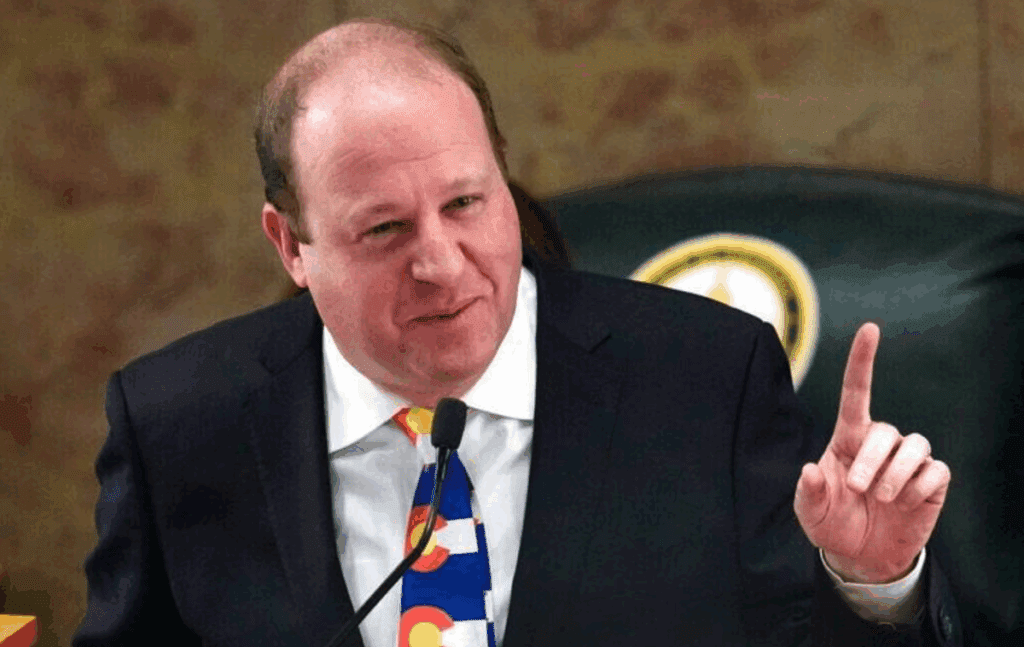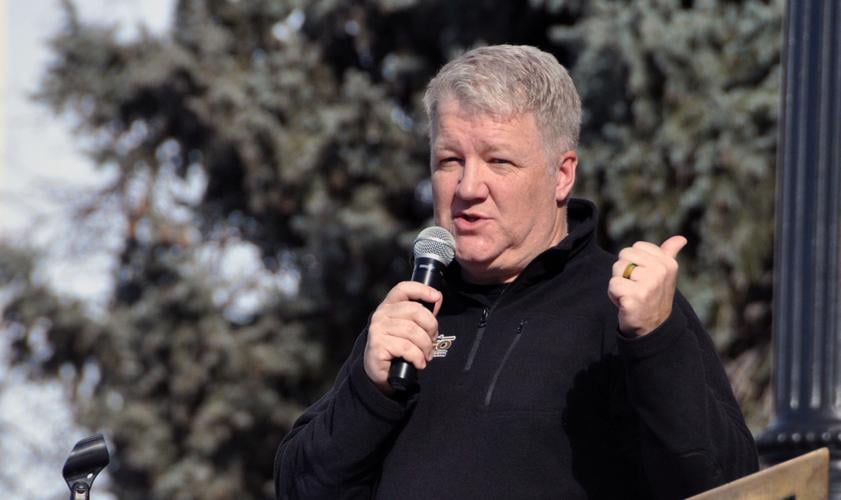‘Is Mike Coffman invincible?’ Aurora Republican talks campaign, policy at 62nd birthday party
Before he talked about the upcoming congressional agenda and assessed his chances in next year’s election – it’ll be a tough race, he’s sure of it – Mike Coffman dropped to the floor last Sunday afternoon and did some push-ups, one for each year he’s been on this earth.
“There’s this ridiculous tradition where I do one push-up for every year,” he said, standing next to a birthday cake covered with candles – there were 30, along with a pair of bigger candles spelling out his age, 62 – and then he called up a spotter and got about getting some exercise to the delight of the crowd. Sixty-two push-ups later, the Aurora Republican leaped to his feet, red-faced and panting slightly, and again welcomed the roughly 100 supporters to the Summit Steakhouse in Aurora for the Coffman campaign’s traditional birthday fundraiser.
“Maybe I shouldn’t have worked out this morning,” he said with a smile, still catching his breath, but only for a minute or so, and then he got down to business.
“This is a very challenging district,” he said, describing the Aurora-based 6th Congressional District and its nearly even shares of Republicans, Democrats and unaffiliated voters.
First elected to office nearly 30 years ago, Coffman has scored an uninterrupted string of wins – some by a whisker – as he’s gone from the state House to the Senate to two terms as state treasurer, election as secretary of state and then five wins to represent the congressional seat, both before and after the district became competitive, including several breaks for active duty in the Marine Corps over the decades.
“As you know, it’s become Nancy Pelosi’s favorite fantasy to defeat Mike,” said former Arapahoe County GOP chair Joy Hoffman, a longtime key Coffman ally. After recounting the offices he’s held, she added, “This man is what we call, in the most truthful way, a public servant.”
The Democrats – including Pelosi, the former House speaker, who helped recruit Coffman’s last two challengers – haven’t made it easy, however.
“Hillary Clinton carried this district by 9 points last year,” Coffman said. “I won it by 8 1/2, thanks to all of you. So, big swing in terms of voting. There just aren’t any other districts like that to this extent where the Democrats – the fact that they do so well here above me makes this a target every time. A national target.”
He’s not overstating it, even by a little.
After the 6th District was redrawn following the 2010 Census, the formerly safe Republican seat turned overnight into one of the closest battleground seats in the country. In 2012, an underfunded and little-known former legislator from southeast Denver, Joe Miklosi, moved a little ways farther east into the district and came within 2 points of toppling Coffman. The next time around, in 2014, another better-funded and better-known Denver Democrat, former House Speaker Andrew Romanoff, likewise decamped into the district but lost by a wide margin, going down by 9 points in a Republican-wave year. Last year the Democrats recruited from within the seat’s boundaries, nominating former Senate President Morgan Carroll, who ran an equally aggressive campaign in a year when Democrats flocked to the polls, but she still fell short, losing by just a little less than Romanoff had.
“I’m going to have a tough race again,” Coffman said. “I have to anticipate that. I don’t know who my opponent is going to be, but what we shouldn’t do is be complacent. Remember the Denver Post article after the election, ‘Is Mike Coffman invincible?’ The reality is, I’m not. Normally, historically, whenever one party has all the levers of power in Washington – the House, the Senate and the White House – that next midterm election can be tough. That’s the historical trend. I have to prepare for that. I wiped out the first two on their bench, running against the former speaker of the House and the former president of the Senate and decisively beating them both. They’ll find someone, but it won’t be that first tier. I’m anticipating, and we all have to anticipate a tough race.”
Coffman thanked his supporters and reminded them he’ll be calling on them for help as the next election approaches, and then he gave a preview of the Republican Congress as it sets out to enact President Donald Trump’s agenda, just over 50 days into the new administration.
“I think the big issue is health care reform, and then we’re going to go through major tax reform,” he said. (The birthday party took place just as the House GOP was preparing to start moving on the American Health Care Act, the proposed replacement for Obamacare, which crashed and burned later in the week when hard-line conservatives and moderate Republicans balked at supporting the legislation. While the bill didn’t wind up reaching the House floor for a vote, Coffman said before it was pulled from consideration that he was leaning toward backing it.)
“And then, after that, we’re going to go through – we’re doing regulatory reform as we speak, and then probably immigration reform, and then something on transportation. So those are pretty much the big priorities in Washington, D.C.,” he said.
Coffman announced that he’d just been named chairman of the House Armed Services Committee’s Subcommittee on Military Personnel, responsible for “all the personnel issues – recruiting, retention, force structure.” Noting that he’s the only member of Congress to have served active duty in both Iraq wars, Coffman said he’s “honored” to be entrusted with the post.
Then he took a handful of questions from the donors, who wanted to know what Coffman thought about the Trump administration’s suggestions that it could crack down on legalized marijuana, as well as what the congressman thought would happen with immigration policy.
Stressing that he didn’t support legalizing recreational marijuana – “I think it was a bad decision for Colorado,” he said – Coffman nonetheless said it was his duty to get behind the people of Colorado, who put it in the state’s constitution. Noting that he thinks the U.S. Constitution clearly leaves commerce within a state up to that state’s government, he said, “So, I’m in the awkward position of having to defend … Colorado’s position, that it has really taken, in front of the Congress.”
Adding that he will never “impose what Colorado has done over any other state,” Coffman pointed out that Attorney General Jeff Sessions has said he plans to get more aggressive enforcing federal law, which still considers marijuana an illegal, controlled substance. “And, so, I’m going to have to go up against him.”
The way he’ll do that, Coffman said, is by working on adding an amendment to an appropriations bill barring the use of federal funds to contravene the will of Colorado’s voters.
“You can write amendments in the appropriations bill in the negative, and what you say is, ‘No federal funds will be used for x,’ and to block the attorney general from coming into Colorado. So it puts me in a bad position, personally, but as a representative for this state, in a decision Colorado has made and placed in our constitution, that is a decision I have to defend.”
He added that he’ll also work to change federal regulations so the marijuana industry has access to financial institutions, including banks and credit unions, noting that an all-cash business both invites crime and is harder to track and tax, as Colorado does.
As far as immigration, a guest wanted to know, “When does the Wall begin to be built between us and Hawaii?” After the chuckles died down, he stated his question more seriously: “This wall situation, to me, is a waste of money when you’re trying to work immigration, even along with health care reform.”
Coffman said he expects Congress will appropriate some money for the wall – a centerpiece of Trump’s campaign, a wall along the border between the United States and Mexico is estimated to cost more than $20 billion and take nearly four years to complete – but suggested he’d prefer to build something more practical.
“The fence, in my view, if you’ve seen the fencing, is more effective than the wall, because you can see what’s going on on the other side of it, vs. the wall,” Coffman said, pointing out that there are walls along some stretches of the border. “But, boy, they pop over that wall, and there’s not much time to catch them.”
Then he predicted that Washington will produce “major immigration reform.”
“And I think at the end of the day, I’ve kind of pieced things together, things the president said, I tell you, they reflect a lot of my views – in this sense,” Coffman said. “That, well, I think there are areas I’m not sure about with him. But here’s what I think: I think we’ve had de facto amnesty in this country for a long time. What we need – I think we need much tougher laws. It’s really not, quite frankly, so much the border, the wall. I think the wall is as much a symbol for the need to do immigration reform that people can rally around. We’ve got to secure our borders. We’ve got to have laws that are enforceable and effective.”
It’s also important to understand, Coffman said, that the country needs to “transition from where we are now to getting that system that we want, that, in my view, ought to have zero tolerance for illegal immigration.”
Another difficult question surrounding immigration policy, he said, is “how you deal with the people that are here now,” and the approach taken by some so-called sanctuary cities.
“One of the questions that came up was sanctuary cities, and the fact that I support suspending federal funds to sanctuary cities,” Coffman said. “And if you look at what Denver has done – and I can tell you, look, there’s prosecutorial discretion where law enforcement and every echelon of government have the ability, in their limited resources, can focus on certain laws more than others, and I get why they don’t want want to focus on illegal immigrants who haven’t violated any other laws other than the immigration laws. But when you’re the City and County of Denver and you’re releasing known violent criminals that should have been turned over to (Immigration and Customs Enforcement), and that there’ve been two recent deaths related to that, that’s just wrong. Their responsibility is public safety, and they’re failing at that responsibility.”
For undocumented immigrants brought to the United States as children – known as DREAMers – Coffman said he feels sympathetic toward their plight and feels the federal government ought to come up with a solution that allows them to stay in the country.
“I can tell you, so, for the kids that were brought here, I feel sympathetic to a lot of them,” Coffman said. “I can tell you, I had a young girl who wanted to go to the United States Naval Academy, who graduated at the top of her class at Hinkley High, and she had all the right courses, had been in sports, had done everything, but her parents took her here illegally when she was a year old from Mexico. She doesn’t know anything about that country. She grew up here, she went to school here, she knows of no other country. And I believe for those people they ought to have a path, based on military service, based on work history or based on education to permanent residence, and they can apply for citizenship.”
As far as undocumented immigrants who arrived when they were older, Coffman sounded nearly as sympathetic, but he made clear that, before too long, things are going to have to change.
“For the adults who knowingly broke the law, as we make this transition, if they haven’t broken any other laws, I think they ought to get a work visa, or something like that, for a limited period of time, and let them stay here without fear of deportation,” he said. “Going forward, we’ve got to be tough. We’ve got to get control of this whole system. I mean, we have de facto open borders right now by virtue of our policies and our weak laws, and we’ve just got to tighten them up.”
At that, Coffman grinned as Hoffman approached – “I’m getting the hook!” – and prepared to lead the crowd in song, wishing him a happy birthday. A few minutes later, he blew out the candles and looked up, a contented smile on his face.











